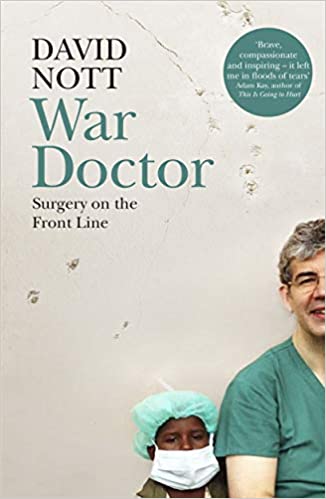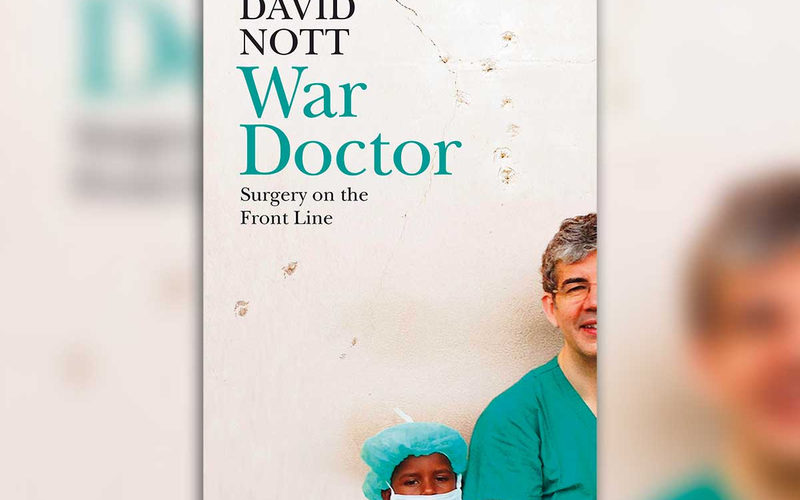Incredible non-fiction filled with so much humanity. A wonderful journey that will leave you in floods of tears. In a growing field of medical memoirs War Doctor stands out for its purpose – to increase awareness of the reality of modern warfare on the individuals and communities directly affected. For more than twenty-five years, Dr David Nott has taken unpaid leave from his job as a general and vascular surgeon with the NHS to volunteer in some of the world’s most dangerous war zones. His memoir is compassionate, inspiring, honest and powerful. It is a book that needs to be in every house.
The conflicts he has worked in are the twenty-first-century combat ridden geographies: Afghanistan, Sierra Leone, Liberia, Darfur, Congo, Iraq, Yemen, Libya, Gaza and Syria. He has also volunteered in areas blighted by natural disasters, such as the earthquakes in Haiti and Nepal. By describing the treatments offered as he attempts to patch up bodies torn apart by weapons designed to inflict maximum damage, he knits a humane account of the many good people risking their lives to help those caught up in war, power and geopolitics.
The author spent his early years in rural Wales. Brought up by his grandparents until he was four, when his parents resumed their guardianship and he moved to London, Nott had few friends, typically bullied in his school days. He had a passion for model aeroplanes (today, he is licenced to fly commercial aircraft and helicopters). About his academic journey he says: “my grades were awful, and certainly nowhere near good enough to get me a place at university to study medicine”. He tried again and won a place at the University of St Andrews.
After graduation, two events changed his life forever. His describes them in the chapter of TWO EPIPHANIES. One surgical and the other a movie. These events launched his career’s humanitarian trajectory. The first came when he performed successful emergency neurosurgery on a rapidly deteriorating patient whose subdural haematoma had threatened to kill her: the author writs “From that moment on, I knew that I wanted to be a surgeon.” Nott’s second epiphany came two years later when he saw a film called The Killing Fields (1984), a depiction of the civil war in Cambodia. The film triggered a sense of mission in Nott, “an urge to work in war zones where my surgery could be put to good use in hospitals like the one in the film”.
Much of the book focuses on memorable surgeries carried out in makeshift hospitals. With a constant stream of all but destroyed bodies arriving, decisions needed to be made quickly about who it would be worth treating. Nearly a routine in which his tales of heroic surgeries go. The explosions, shelling and exchanges of gunfire, which even involve bullets flying through the operating theatre. His expertly-crafted narrative often evokes a sense of excitement typically associated with thrillers. On one occasion a man required every unit of blood available in the city. When he subsequently died the question of how many others would die for want of a blood transfusion lingered.
There are many interesting encounters Nott recalls in the book: one of them goes as below.
On a mission in Aleppo he noticed that patients would arrive with similar injuries that changed each day. He wondered and asked to which the answer he got was shocking:
“Abdulaziz told me that he’d heard that the snipers were playing a game: they were being given rewards, such as packs of cigarettes, for scoring hits on specific parts of the anatomy. […] This sick competition reached its nadir towards the end of my time there when it appeared that one particularly vicious and inhumane sniper had a new target of choice: pregnant women.”
The author treated several of these women whose babies had been shot in utero. It was this experience that finally drove him to try to publicise the horror of what was happening in Aleppo once he returned to London. The media showed interest and he began to offer interviews and share pictures taken. Harnessing his increasingly public profile, Nott sought to help those now trapped and in imminent danger in Syria.
David Nott began to realize that flying into a catastrophe – whether war or natural disaster – was not enough. Doctors on the ground needed to learn how to treat the appalling injuries that war inflicts upon its victims. With his wife he set up the David Nott Foundation. He writes lovingly about it: “[t]hrough Elly’s diligence and hard work, the David Nott Foundation was awarded charitable status in July 2015”. Since 2015, the foundation has disseminated the knowledge he has gained, training other doctors in the art of saving lives.
Nott married Elly relatively late in life and they have two daughters; he helped establish the Surgical Training for Austere Environments at the Royal College of Surgeons. He also documents the challenges of managing the politics that sits behind conflicts in a given country as well as working with the UN and to share the very knowledge and experience he has gained first-hand so others are well enough prepared to handle life or death situations in war torn areas.
As we move along reading till the end, we get to see the personality DAVID. To see the best of David is to observe him with two very different groups of people. The first are the Syrian doctors he loves like brothers, and the second are his daughters.
DAVID EMBODIES THE TRULY HEROIC, IF WE WILL BUT ALLOW OUR HEROS THE VULNERABILITY AND HUMANITY THAT MAKE THEM REAL PEOPLE.
WAR DOCTOR is an extraordinary story. An inspiring read for everyone.

By David Nott
Read More On Amazon



